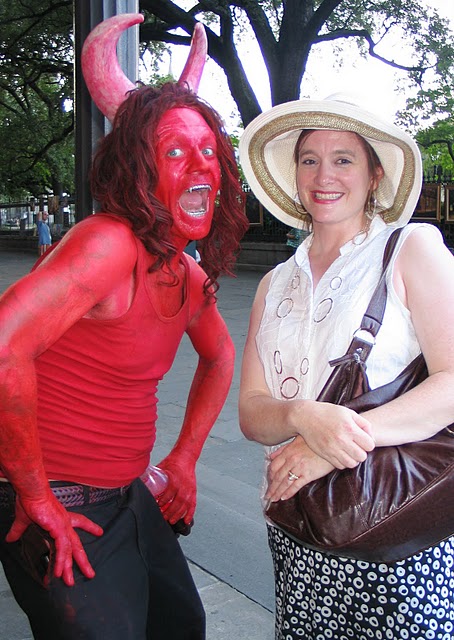
When my sister and I were in New Orleans last month, we encountered all kinds of interesting sights, including the devil himself. (Sorry if I scared anyone right off. Hang on and I’ll make my point soon!)
Well, not really the devil. He claimed he was a father of two young children who was “just trying to make a buck” for his family. He may have been bluffing, or he may have been telling the truth. Both my sister and I, who took a few minutes out of our day to hear him out, recognized something sad but sincere in his eyes. Though he was an unavoidably striking character, I wasn’t repelled. I’m no longer as naïve as I once was, but I’m still intent on at least trying to see the humanity in everyone I meet whenever possible. Yes, even a stranger who isn’t a real doctor devil but plays one on TV in the French Quarter.
This visual calls to mind a few poignant messages I’ve read of late, both from writers who are in tune with light and love but recognize as well the darkness in our world, as well as how we, as carriers of the Light, might make sense of darkness.
The first of them, St. Catherine of Sienna, is considered a “doctor” of the Church; someone who was so well-formed in matters of faith that she was relied upon as a papal counselor in her time (1300s). Anyone who counsels popes has my immediate attention!
As shared in the July issue of Magnificat, St. Catherine once advised her fellow Christians on how to deal with what “the enemy” does. She began by saying that people in love with Christ don’t evade the troubles they encounter, “whether from the devil or because of obedience.” Rather, they realize that “the more they find to suffer, the happier they are…For they know that the more their love and will are bound here below, the more generous they are, and the more closely they are bound to Christ.”
I’ve talked with quite a few believers who have issues with Catholic thought on suffering, but I believe it’s due to a slight misunderstanding. It’s not that we believe God punishes us through making us suffer, or even causes it, but that He allows it, in part with the hoped-for outcome of drawing us further into Him. Who would argue that when things are going smoothly it’s harder to admit or recognize dependence on God?
St. Catherine goes on: “You say to me, ‘What can I do when I experience such darkness and blindness of spirit that there doesn’t seem to be a thread of light by which I can hang on to hope?” Her answer? To boldly face the devil and say, “If divine grace were not in me, I would have no good will but would be following your tricks and my own evil thoughts. But I trust in our Lord, Jesus Christ, who will keep me safe right up to the end of my life.”
She encourages the faithful to “open the eye of your reason” to see that knowledge of ourselves makes us humble. “We come to such knowledge precisely through all the darkness and all the devils’ annoyances. And we grow in zeal and in love for God because we see that without God there is no defending ourselves. And we discover God in ourselves by discovering our good and holy will.”
But how do we discover this good and holy will? The second prophet who has captured my attention this week helps fill in the blanks. He is none other than our current pope, Pope Benedict XVI. Recently discussing the parable of the sower, he said, “Jesus compares the Kingdom of Heaven to a field of wheat, to make us understand that within us is sown something small and hidden, which, nevertheless, has an unrestrainable, vital force.”
He continued, saying that this something small and hidden — this seed — will develop and mature despite all obstacles “if the terrain of life has been cultivated according to the divine will.”
At the same time, he reminded us that after the owner planted the seed, “his enemy came and sowed the weeds.” He then noted St. Augustine’s observation that many at first are weeds and then become good seed. This is possible when those who acting wrongly are endured with patience.
Lovely words, I find, especially “within us is sown something small and hidden” which contains an “unrestrainable, vital force,” and the idea that good will triumph over evil within the hearts of those who have been endured with patience.
We all have the potential to allow the devil in us to take over. Once we have mastered this temptation as well as possible, we are to endure with patience those who seem to have fallen within the weeds. In other words, we must never give up on ourselves nor one another, not even those who appear devilish on the outside. You never know what kind of flicker of God’s light might be alive within them, and how patience might turn a weed into a lovely strand of life-giving wheat.
I’m struggling right now with a few weeds that seem to have invaded my peace garden. I need to remember their potential to become something life-giving through patience and love.
Q4U: What weeds are you willing to believe in?
Copyright 2011 Roxane Salonen
About the Author

Roxane Salonen
Roxane B. Salonen, Fargo, North Dakota (“You betcha!”), is a wife and mother of a literal, mostly-grown handful, an award-winning children’s author and freelance writer, and a radio host, speaker, and podcaster (“ Matters of Soul Importance”). Roxane co-authored “ What Would Monica Do?” to bring hope to those bearing an all-too-common cross. Her diocesan column, “ Sidewalk Stories,” shares insights from her prolife sidewalk ministry. Visit RoxaneSalonen.com


.png?width=1806&height=731&name=CatholicMom_hcfm_logo1_pos_871c_2728c%20(002).png)
Comments